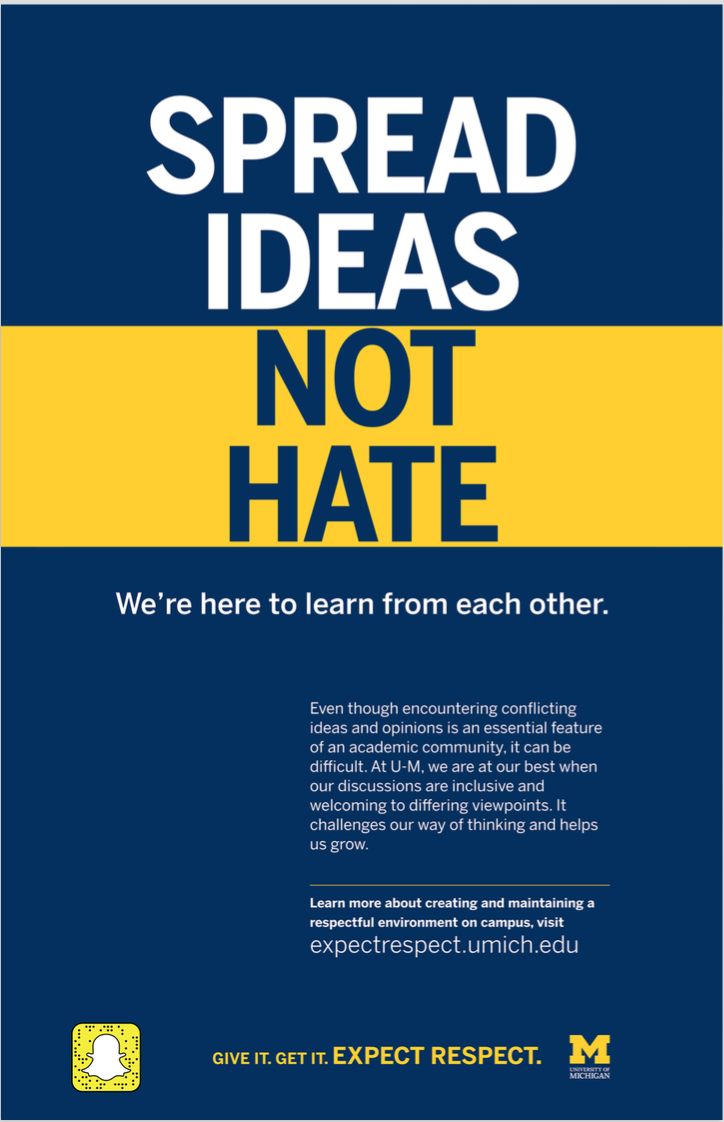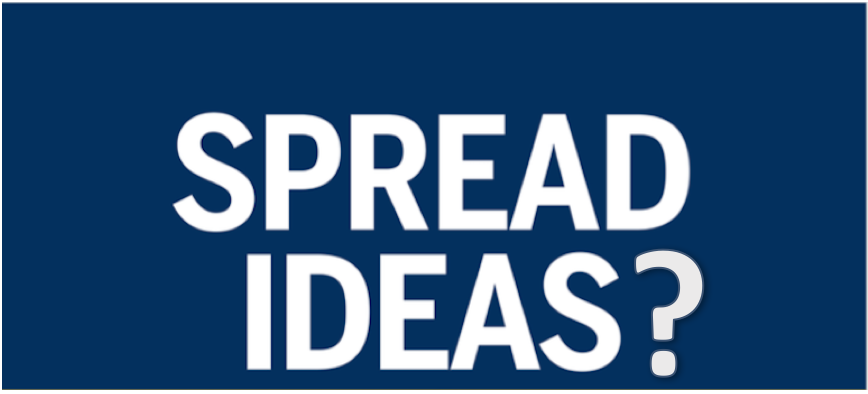U of M students should be highly suspicious of this program and others that are aggressively popping up around campus. In particular, threats to our free discourse must be recognized for what they are and challenged. In the face of propaganda like that of Expect Respect, students should ask questions and investigate rather than passively succumb to authority.
 The word “doublespeak,” first mentioned in the dystopian world of George Orwell’s 1984, is generally held to mean “language that deliberately obscures, disguises, distorts, or reverses the meaning of word.” It may be hyperbolic to call the University of Michigan’s academic climate “Orwellian” at this point in time. However, the Foundation for Individual Rights in Education (FIRE) recently included the U of M in its list of ‘red light’ schools, flagged for their “highly restrictive speech codes.” In particular, the organization called out Michigan’s “Expect Respect” program, on the grounds that it “clearly and substantially restricts freedom of speech.”
The word “doublespeak,” first mentioned in the dystopian world of George Orwell’s 1984, is generally held to mean “language that deliberately obscures, disguises, distorts, or reverses the meaning of word.” It may be hyperbolic to call the University of Michigan’s academic climate “Orwellian” at this point in time. However, the Foundation for Individual Rights in Education (FIRE) recently included the U of M in its list of ‘red light’ schools, flagged for their “highly restrictive speech codes.” In particular, the organization called out Michigan’s “Expect Respect” program, on the grounds that it “clearly and substantially restricts freedom of speech.”
What exactly is “Expect Respect?” If you’ve been anywhere near the U of M campus you’ve likely seen the slogan emblazoned on T-Shirts and on posters plastered around residential and academic buildings. The most common poster, found on the homepage of Expect Respect, proclaims, “SPREAD IDEAS NOT HATE.” Below this headline, a short paragraph on the posters reads:
“Even though encountering conflicting ideas and opinions is a central feature of an academic community, it can be difficult. At U-M, we are at our best when our discussions are inclusive and welcoming to differing viewpoints. It challenges our way of thinking and helps us grow.”
At first glance this rhetoric appears to be pro-free speech, calling for a more open intellectual climate even at risk of emotional discomfort. Upon closer inspection, however, the poster contains very few clues as to what Expect Respect actually is or does. Apart from the program’s URL nestled at the bottom of the page, the poster mostly consists of vagaries and buzzwords.
If a confused student were to navigate to the program’s website they would have further difficulty in discerning the initiative’s purpose. The “About Us” page echoes the meaningless fluff of “SPREAD IDEAS NOT HATE,” similarly making gratuitous usage of the word “inclusive.” Only in the “Report an Incident” tab does Expect Respect’s purpose become clear: to stamp out “bias-related incidents” through streamlined avenues such as a “bias hotline” and an online reporting form. Despite its warm and positive branding, Expect Respect turns out to be little more than a disciplinary committee.
In the FAQ section, Expect Respect briefly defines bias-related incidents as activities that “harm another because of that person’s membership in a classification, such as race, color, ethnicity, national origin, sex, gender identity or expression, sexual orientation, disability, age or religion.” As far as specific rulings on bias and the school’s disciplinary responses, no formal methodology is provided. Expect Respects lists only a couple of examples of bias-related incidents, such as “making fun of another person because of his or her language or accent.” Contentious and relevant issues like microaggressions and cultural appropriation are curiously absent from the website, leaving much to the imagination.
Whether or not one supports Michigan’s implementation of this bias-incident system, Expect Respect’s outreach is exceedingly propagandistic. In the initiative’s public rhetoric the meanings of words like “inclusive” and phrases like “welcoming to differing viewpoints” are profoundly reversed; here they denote restriction and repression of speech and actions. Its rhetoric also relies on extreme ambiguity, throwing out broad and loaded terms like “hate” and “respect” while avoiding the specifics of the program itself.
U of M students should be highly suspicious of this program and others that are aggressively popping up around campus. In particular, threats to our free discourse must be recognized for what they are and challenged. In the face of propaganda like that of Expect Respect, students should ask questions and investigate rather than passively succumb to authority.
The University of Michigan is not immune to the wildly polarized rhetoric of 2016; opposing political, cultural, and intellectual viewpoints are presented as all-encompassing truths, hostile to honest discussion and analysis. As public figures and institutions grow increasingly partisan they resort to manipulative and dishonest rhetorical strategies. From Donald Trump’s bombastic tweets to John Oliver’s snarky monologues, words seem geared towards emotional effect rather than clear meaning. Now more than ever it is crucial to discern fact from fluff, argument from advertisement.
